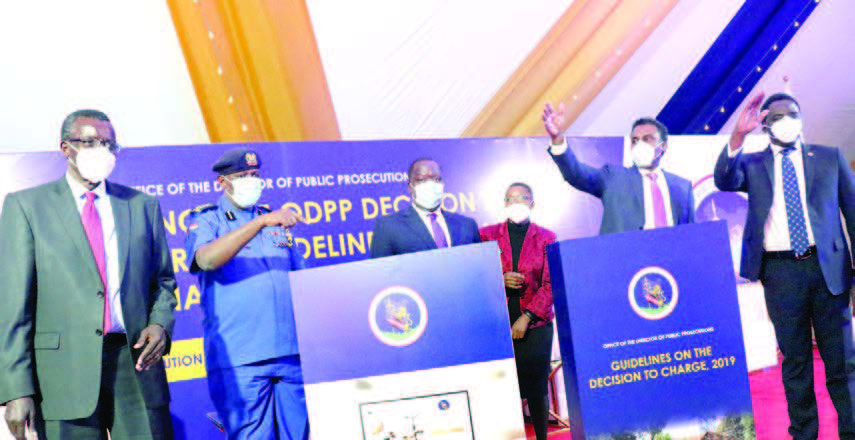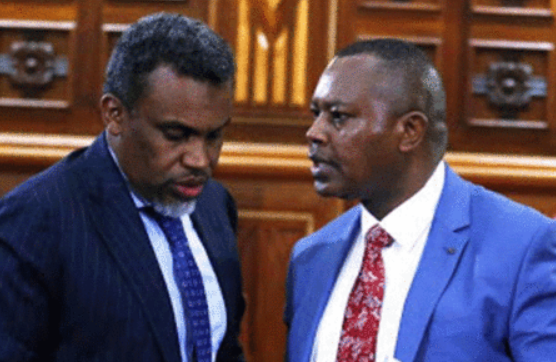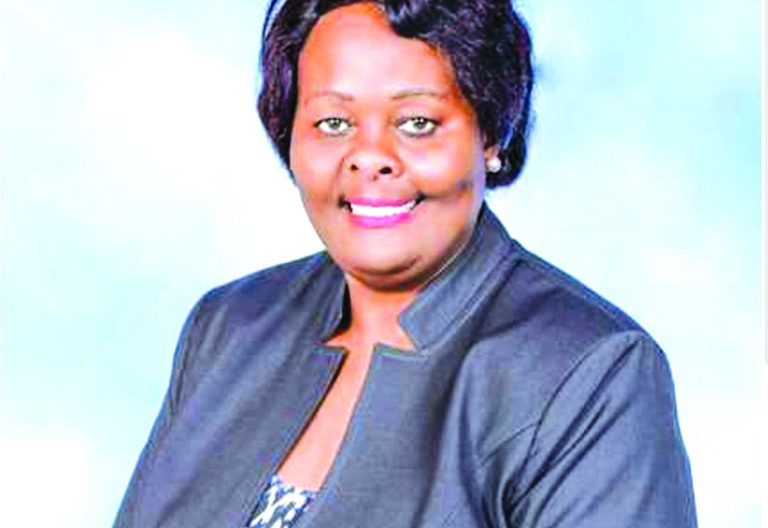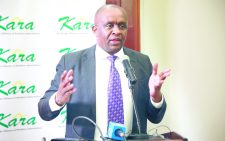Haji-Kinoti feud drags on as DCI skips key meet

DPP stamps his authority that decision to prosecute lies squarely with his office. The DCI has made attempts but they’ve been rebuffed.
The Office of Director of Prosecution (ODPP) has stamped authority on the prosecution.
The Director of Public Prosecution Noordin Haji on Tuesday stated that according to the Constitution, the decision to charge rests entirely with his office.
In what is going to rub the Director of Criminal Investigations (DCI) George Kinoti the wrong way the ODPP stated: “The decision to charge or not to charge requires an objective and independent analysis of the case. Whilst the roles of the investigator and the prosecutor are complimentary, ultimately the decision to charge rests with the prosecutor”.
Yesterday’s meeting that was meant to bring harmony in the justice system and ensure efficiency in the execution of the different mandates ended up exposing the huge wedge between the two offices.
Mr Kinoti, who was scheduled to make his presentation before Inspector General Hilary Mutyambai, gave the meeting a wide berth. Tellingly, the decision to charge or not has been a sore thumb in the working relationship of the pair that once enjoyed a bromance.
The most embarrassing spat between the two offices was the prosecution of Kenya Ports Authority officials over corruption. The DCI had dragged KPA MD Daniel Manduku and others to court and when the magistrate asked for the charge sheet the ODPP said he was surprised the officials were in court. They were released unconditionally forcing the DCI to publicly lament.
To resolve such hitches and disputes and to streamline the justice system to avoid suspects and cases falling through the cracks the launch of an electronic case management system by the Office of the Director of Public Prosecutions to ease the process of filing and prosecuting cases will enhance transparency and at the same time create synergies and better working ties with other agencies.
The Case Management Systems (CMS) will be integrated into the systems of the investigative agencies and allow them, for example, to upload evidence to the system which will then be available to the ODPP for independent review towards making the decision to charge.
According to the Judiciary and the ODPP, the CMS will ensure just and expeditious disposal of criminal cases.
All documents and files from the investigative agencies including the Directorate of Criminal Investigations (DCI), the Ethics and Anti-Corruption Commission (EACC), and the IPOA forwarded to the ODPP will be scanned and indexed to maintain a searchable soft copy that can easily be tracked.
There will also be screening of files to determine the office and individual best placed to handle the file, and tracking of physical document and file movements between offices and individuals.
Real-time reports on the status of inquiry files and other reports on data captured such as a list of witnesses, list of exhibits, list of cases by thematic area will be key.
Once a decision to charge has been made and a charge sheet prepared, it is then electronically filed to the Judiciary through the e-filing system.
Document tracking
As a result, prosecutors will be able to dispense cases through document tracking, case tracking, and e-filing.
Mr. Haji Tuesday said the system involved the use of integrated menus developed for among other things receiving cases, allocating cases, managing official documents, serving documents, preserving documents.
“CMS involves the exchange of electronic information between the police, prosecution, the Judiciary, and the Prisons Department through an information system,” the DPP said.
Haji said the prosecutors will only accept cases where they were satisfied that there was sufficient evidence to provide a realistic prospect of conviction against each suspect on each charge.
“The standard required in making the decision to charge is whether there is a reasonable prospect of conviction, considering evidential and public interest test,” he said.
The public interest test is what is in the interest of the wider administration of justice, depending on the seriousness of the offense.
“The more serious, the more likely it is that a prosecution is required. When assessing seriousness, consider the suspect’s culpability and the harm caused,” the DPP said.
The system includes the receipt of files and correspondence from investigative agencies, the case analysis, the decision to charge, plea negotiations, pre-trial sessions, trial process timekeeping, and organisation skill.
“The system will continue to be enhanced to include other additional capabilities such as interactive chats and e-learning to facilitate the work of prosecutors,” the ODPP said.
Chief Justice David Maraga said it heralded a new and promising era of limiting human factor and its attendant errors in efficiency and corruption, in the administrative and decision-making processes.
“The cases of missing files, delays, and general lack of accountability and transparency will be a thing of the past,” CJ Maraga said.
“Easy access and retrieval of information will facilitate effective decision making in the process of prosecution and thus enhance the quality and value of critical decisions required in the course of their work,” added Maraga.
The guidelines document the steps to ensure fairness, consistency, transparency and accountability.
They will be applied equally and fairly, according to Maraga. Members of the public, the accused, and other persons who interact with the public prosecutions service will have a more reliable and trusted channel of getting information regarding the status and progress of their cases with ease.
“The digital platforms lend themselves more easily to collaboration and cooperation in service delivery than manual systems,” Maraga said.
The CJ added that the guidelines would bring to an end the arbitrary use of prosecution powers.
“The guidelines provide a basis and gauge against which the legitimacy of decisions taken can be measured. We must always remember that constitutional power is constrained power which must be exercised,” he said.
Speaking during the launch, Interior Cabinet Secretary Fred Matiangi said there was a need for synergy and the agencies to work closely together.
“As a country, we are guided by what the law says. The police should keenly study the guidelines. This will bring high level of transparency,” he said.
The ODPP had developed a multi-pronged approach to ensure that some criminal cases are resolved without resorting to full judicial proceedings.
Plea bargain
The alternatives to prosecution include plea bargain, diversion, and deferred prosecution agreements, that give priority to alternatives to prosecution.
Unlike the past where the criminal practice in Kenya has long focused on retributive justice with an emphasis on punishing offenders, the new approach instead focuses on compensation and restitution, restoration and reintegration.
The launch at the Prosecutorial Training Institute in Loresho was attended by the CJ Maraga, the Interior Cabinet Secretary Fred Matiangi, the Ethics and Anti-Corruption Commission CEO Twalib Mbarak, the Inspector General of Police Hillary Mutyambai, and the Assistant Chief of Defense Forces Maj Gen Fatuma Ahmed.
Also in attendance were the Director of Administration at the National Intelligence Service (NIS) Agnes Shikuku, Law Society of Kenya President Nelson Havi, Independent Policing Oversight Authority (IPOA) chairperson Ann Makori, Ben Shamalla of the International Justice Mission (IJM), and the EU Ambassador to Kenya Simon Mordue among others














